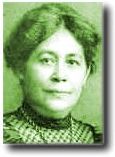
|
Mrs. J.M.C.
Kloppenburg-Versteegh
|
Het leven van de Europeesche vrouw in Indië
(Life of the European woman in the Indies)
"To the best of my ability I shall document that which has brought me enlightment and strength during the completion of my burdensome duty. Dear readers, you will agree that being mother to twelve childeren and accepting the responsibility of care for many others less fortunate has not been a light task (..) I have wished to be able to remove those stumbling blocks of life, upon which I have also painfully suffered, for those of my fellow human beings, for my readers, who are likewise burdened."
Mrs.Kloppenburg makes reference here to the position of each individual within society and the difficulties in establishing oneself within the respective niche. The adhrerence to the system of hierarchy was obligitory and if none knew their rightful place then chaos would follow. Het leven van de Europeesche vrouw in Indië explained the rules governing civilised existence.
This guide to life led the reader by the hand through a typical Indonesian day from the moment of arising in the morning until the time to retire in the evening. This was followed by general thoughts on the turbelent existence and the importance of putting ones trust in God. Accompanying the book were a number of sowing patterns with which a reasonably adept woman would be able to fabricate items of Indonesian clothing such as a sarong of kebaya.
Notwithstanding the diverse nature of her advice Mrs.Kloppenburg accentuated two centrale messages to her readers. Firstly, it was to be clear that no matter what transpired the European woman may in no way 'go native' and become lazy and easy going. To counteract this danger it was suggested that an active life was the best remedie, "as for the good housewife there was, in her life, no place for boredom (..) her industriousness would have a beneficial effect on husband, childeren and servants." Should the man-of-the-house not be positively influenced by her efforts, and exhibit nevertheless grumpiness Mrs. Kloppenburg had the answer to hand."Do not argue with him. Is the mood past then you may quietly reason with him and without doubt womanly wiles will triomph."
This self control was vital for the second message for the lady of the house. In general terms she had had little experience of dealing with servants and most certainly not with servants of a foreign culture. Taken from the perspective of the woman's status and self-interest it was important to keep distance to the servants so that the boundaries of 'us' and 'them' be cleary defined. The housewife should not be constantly reminded by them of their 'difference'. An ideal servant should be open and sympathetic to education into the European mould. To achieve this with a loving hand was, as Mrs.Kloppenburg explained, the womans duty.
Those who took Mrs.Kloppenburg's advice to heart would survive in the Netherlands-Indies. She wrote encouragingly:
"A civilised woman possessing wil-power and without prejudice to this beautiful country will be well able to survive."
[Copyright © 1999/2009]
laatste update:
12.07.2009
[sitemap]
![]()
 |